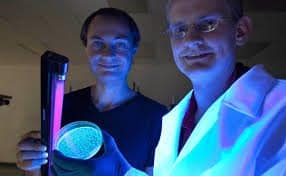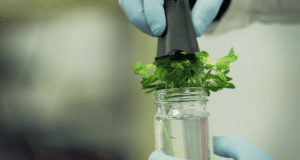Kickstarter’s first synthetic biology project, the Glowing Plant, which was launched April 2013 by Antony Evans, Fulbright  Stanford post-doc fellow Omri Amirav-Drory, PhD and Kyle Taylor, PhD (from Stanford) has made the news again for its syncing with Y Combinator. The Silicon Valley venture capital firm makes investments of $120K in a large number of startups every year. Some of the past 700 startup funding recipients include Reddit, Disqus, AirBnB and DropBox; the companies have a combined valuation totaling $30 Billion. Y Combinator’s link to Glowing Plant marks its trek into life sciences and biotech; in the past the company has invested in web and tech companies.
Stanford post-doc fellow Omri Amirav-Drory, PhD and Kyle Taylor, PhD (from Stanford) has made the news again for its syncing with Y Combinator. The Silicon Valley venture capital firm makes investments of $120K in a large number of startups every year. Some of the past 700 startup funding recipients include Reddit, Disqus, AirBnB and DropBox; the companies have a combined valuation totaling $30 Billion. Y Combinator’s link to Glowing Plant marks its trek into life sciences and biotech; in the past the company has invested in web and tech companies.
 The Glowing Plant Kickstarter campaign raised more than $484,000 from 8,433 backers, promising to send donors seeds for a small flowering plant and member of the mustard family, the Arabidopsis thaliana, that are genetically engineered to carry bioluminescence genes causing the plants to emit a faint blue-green glow. According to Crowdfund Insider’s JD Alois, “The Glowing Plant campaign has captured the imagination of many individuals as the campaign organizers positioned themselves as creating plants which could potentially replace street lamps using synthetic biology they are creating sustainable natural lighting.”
The Glowing Plant Kickstarter campaign raised more than $484,000 from 8,433 backers, promising to send donors seeds for a small flowering plant and member of the mustard family, the Arabidopsis thaliana, that are genetically engineered to carry bioluminescence genes causing the plants to emit a faint blue-green glow. According to Crowdfund Insider’s JD Alois, “The Glowing Plant campaign has captured the imagination of many individuals as the campaign organizers positioned themselves as creating plants which could potentially replace street lamps using synthetic biology they are creating sustainable natural lighting.”
Glowing Plant’s CEO and INSEAD MBA grad Evans told TechCrunch that Y Combinator saw a viable investment in his company in part due to plummeting costs surrounding genome sequencing and gene manipulation technologies. “The rise of the affordable biotech company is what’s driving [Y Combinator’s] interest in the space,” he said.
 “The glowing plant is still our first focus, but we’re beginning to expand outside that range,” said Evans. “An analogy could be like the 1980s vision of having a desktop computer for every home. We would like to see every house have genetically modified organisms.”
“The glowing plant is still our first focus, but we’re beginning to expand outside that range,” said Evans. “An analogy could be like the 1980s vision of having a desktop computer for every home. We would like to see every house have genetically modified organisms.”
The startup’s website explains that the glowing plant is made using the tools of synthetic biology, using a design print transform cycle. The team designs its DNA sequences on a computer using special Biocad software, then makes the DNA using DNA laser printing before using a Gene Gun to insert the DNA into the plant. “The more we iterate through the cycle, the brighter the plant will be,” avers the startup. “Every pre-order helps us increase the number of iterations we can do.”
“The big problem holding back the space are consumer expectations because of the way the conversation is being framed by large industrial companies,” continued Evans. “We really see our plants as a tool for changing that debate. With food, the risk of unintended consequences is much larger. We just want to build fun, cool products.”
“But the project is sowing more than glowing plant seeds,” states The Scientist’s Bob Grant. “It’s reigniting a debate over  responsible uses of synthetic biology and the release of genetically modified organisms into the environment.” Covering the controversy, Grant cites: “Synthetic biologists worried about the negative press that may accompany any mishaps with the plants, especially if they managed to proliferate in the wild. One advocacy group even launched a campaign to stop the project entirely. However, the biologists behind the project insisted that they had taken measures to ensure that fulfillment was safe.” Kickstarter placed a ban for future Kickstarters from offering GMOs as a reward level. The update to their guidelines for project creators was made on July 31, 2014, after Glowing Plants was fully-funded.
responsible uses of synthetic biology and the release of genetically modified organisms into the environment.” Covering the controversy, Grant cites: “Synthetic biologists worried about the negative press that may accompany any mishaps with the plants, especially if they managed to proliferate in the wild. One advocacy group even launched a campaign to stop the project entirely. However, the biologists behind the project insisted that they had taken measures to ensure that fulfillment was safe.” Kickstarter placed a ban for future Kickstarters from offering GMOs as a reward level. The update to their guidelines for project creators was made on July 31, 2014, after Glowing Plants was fully-funded.
 Bob Grant reported further that the Silicone Valley entrepreneurs behind the Glowing Plant Project have satisfied the USDA’s existing regulations regarding the development of GM plants. The agency’s Animal and Plant Health Inspection Service (APHIS), which regulates GM plants and tries to ensure that the plant pathogen Argobacterium—a commonly used transfection vehicle—will not escape once GM plants are released in the field. By only using Argobacterium in the early stages of development and using a gene gun—a technology that is not regulated by the USDA—to insert foreign genes into the seeds that will be sent to donors, the Glowing Plant Project team satisfied APHIS regulators that the plants pose no risk, reported Nature.
Bob Grant reported further that the Silicone Valley entrepreneurs behind the Glowing Plant Project have satisfied the USDA’s existing regulations regarding the development of GM plants. The agency’s Animal and Plant Health Inspection Service (APHIS), which regulates GM plants and tries to ensure that the plant pathogen Argobacterium—a commonly used transfection vehicle—will not escape once GM plants are released in the field. By only using Argobacterium in the early stages of development and using a gene gun—a technology that is not regulated by the USDA—to insert foreign genes into the seeds that will be sent to donors, the Glowing Plant Project team satisfied APHIS regulators that the plants pose no risk, reported Nature.
Glowing Plant’s Evans stresses that Glowing Plant is not focusing on food products like Monsanto and its politically controversial genetically modified foods. Furthermore, the startup is not working with gene pathways that promote selective advantages that would help plants compete with other living organisms or disrupt existing ecosystems. Seeds may be pre-ordered on Glowing Plant’s website, on track to ship during Fall of 2014.
____________________________________________________________
Have a crowdfunding offering you'd like to share? Submit an offering for consideration using our Submit a Tip form and we may share it on our site!

